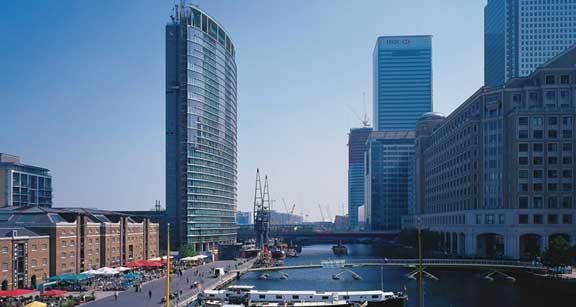
Monaco-based freeholder John Christodoulou was in tribunal at the beginning of the month fighting the court appointed manager at Canary Riverside, last week he was back again in a row with leaseholders at West India Quay.
The two prime London Docklands sites, both near Canary Wharf, have witnessed repeated acrimony between the residential leaseholders and the freeholder.

This time the issue was over whether the leaseholders at West India Quay are subsidising the energy consumption of the 12-storey Marriott Hotel on site, and assorted serviced apartments. These are part of Mr Christodoulou’s interests, the tribunal was told.
The action was initiated by East Tower Apartments Limited, an investor owning and renting out 42 flats at the 33-storey site, which thinks it is paying too much – a view shared by other leaseholders at the site, although they were not a party to the case.
The commercial part of West India Quay amounts to 47% of the total, while the rest is 158 apartments with 999-year leases.
As with Canary Riverside, the commercial portion is greater than 25%, so right to manage and freehold enfranchisement are not options for the leaseholders. This is an issue that LKP is urging the Law Commission to address in its enfranchisement reforms.
East Tower Apartments Limited is no stranger to challenging John Christodoulou in court, and it challenged energy charges in 2015, which seemed to result in an accord.
No.1 West India Quay (Residential) Ltd v East Tower Apartments Ltd [2018] EWCA Civ 250
Leases often provide that a landlord may not unreasonably refuse consent to assign. In this case, applicable to both residential and commercial leases, the Court of Appeal considered whether consent was unreasonably withheld where two of the grounds for refusal were reasonable, but a third had been held not to be.
But the case last week returned to the issue, with East Tower Apartments Limited arguing that the original ruling lacked clarity.
Two days were put aside for this, with another one scheduled in March. As both sides have armed up with barristers, this is a costly affair.
East Tower Apartments Limited argued that the leaseholders should not be subsidising the commercial premises by paying more for their “direct electricity”, which goes straight to the apartments and is metered. But there are “indirect electricity” charges that relate to the energy used for heating, cooling and domestic hot water, which comes through a central plant.
West India Quay is one of the most expensive blocks in London, and its striking blue-glass angles have been used numerous times in films, such as the gangster caper Layer Cake.
That did not prevent barrister Justin Bates, for the freeholder, likening the iconic site to flats above a humble chippie:
“The analogy is with insurance of a flat above a fish and chip shop … the nature of that building means higher insurance … the nature of this building, given its size and commercial parts, means that you have to pay a charge to the grid for access. It’s just a cost this building has to bear.”

For East Tower Apartments Limited, counsel Lina Mattsson said that her client and other leaseholders “have accurate readings – we can prove we did not consume it [the energy]. We should be paying for what has been consumed, in accordance with the actual utility bill charges.”
The tribunal heard that there were almost 600 “bulk meters” throughout the building, most of which are not functioning properly: “… 550 more than they need, [and] they don’t sound to me reliable,” said Judge Geddes.
He added: “The landlord has been repeatedly warned from 2006 on that his meters need to be replaced. And he has not done anything about it.
“If my meter is saying I consumed 100 units, why should I – as a leaseholder – be paying for more than what the utility company is charging?”
Mr Bates, for the landlord, responded:
“Our point is that the only thing you can rely on is the utility company. We’re using what has been billed to us by the utility company as the starting point. The fundamental different view is do you start from the leaseholder perspective, or the landlord perspective?”
Mr Bates referenced Ofgem guidance, claiming “I am required, as per the Ofgem guidance, to recover not more than I pay. Ofgem does not require me to make a loss. It requires me not to make a profit.”
Ms Mattsson told the tribunal:
“The problem for the landlord is he has a vested interest in that the hotel, which is part of the same group, would have to pay. This is why he is talking about a loss.”
The case continues, with a final sitting scheduled for Monday 18 March.





 LKP praises Law Commission over commonhold in Telegraph
LKP praises Law Commission over commonhold in Telegraph






















I can see the FtT being very busy especially if legislation is leveled between leaseholder and freeholder regarding costs etc. With a potential 6m leaseholders, time to spread the news about this feudal nonsense and let the battle commence.
Why can Management companies be allowed not to be in a government redress system – my imposed Management Agent – collects £1.1m from the Lessees per year and he is not in any redress system.
Every battle with the Free-Holder who also owns the Management company is so difficult to negotiate with, and it’s a fight every day every week after you come home from work to face.
johnny – Mann Island. LIVERPOOL
It has long been my belief that managing agents should be bonded in much the same way that ABTA bonds travel companies..
It is beyond belief that as things currently stand a person with a criminal record for fraud can come out of jail and, set themselves up as a managing agent and hold millions of pounds of service charge funds..